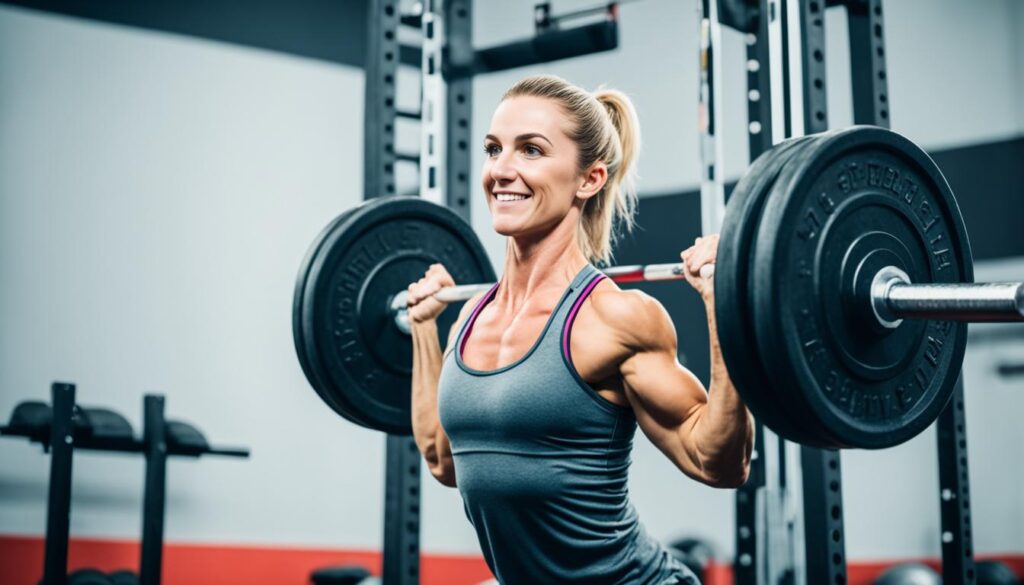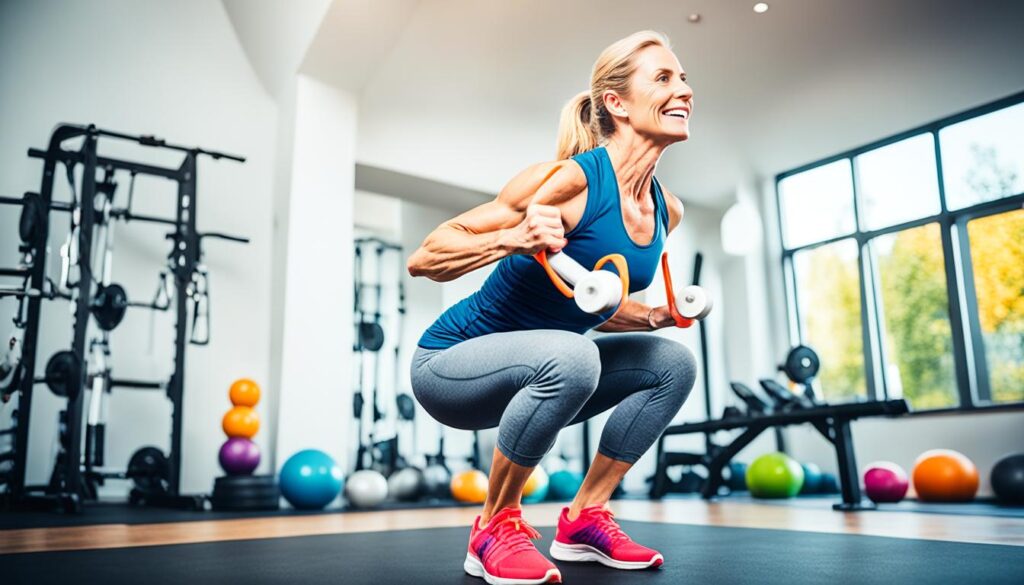Keeping your bones strong and healthy matters a lot. What you eat, how active you are, and the choices you make can affect your bones. It’s key to focus on your bone health all the time. Doing so can help avoid problems like osteoporosis and lessen the chance of breaking a bone.
Key Takeaways:
- Proper bone health is crucial for strong and healthy bones.
- Diet, physical activity, and lifestyle choices play a significant role in maintaining bone health.
- Osteoporosis and fractures can be prevented with regular bone health maintenance.
- Prioritize bone health throughout life to minimize the risk of bone-related conditions.
- Consult a healthcare professional for personalized recommendations based on your risk factors.
Why is Bone Health Important?
Bone health is key to our body’s well-being. Our bones do many important jobs, from providing structure to protecting organs. They also help with movement by anchoring our muscles and store calcium.
This prevents a condition called osteoporosis, where bones become weak. Prioritizing bone health from an early age is crucial. It helps avoid osteoporosis and keeps our skeletons strong.
Childhood and adolescence are critical for bone growth. It sets the base for lifelong bone health. Even in adulthood, our bones keep renewing, but these changes slow down after 30. Achieving peak bone mass by then is very important for fighting osteoporosis and staying healthy.
Role of Bones in the Body
Our bones are like our body’s frame. They support and shield organs like the heart. They also let us move by working with muscles. Plus, they help control minerals in our body, like calcium. This is vital for our nerves, muscles, and blood.
Poor bone health can lead to trouble like fractures, less movement, and pain. Keeping our bones strong and healthy is critical for our well-being and life quality.
| Functions of Bones | Effects of Poor Bone Health |
|---|---|
| 1. Structural support | 1. Increased risk of fractures |
| 2. Organ protection | 2. Decreased mobility |
| 3. Muscle anchoring | 3. Chronic pain |
| 4. Calcium storage | 4. Limited physical activity |
“Strong and healthy bones are the foundation for an active and fulfilling life.”
Factors Affecting Bone Health
Many things can change the health of your bones. It’s important to know how these things can make your bones strong or weak. Understanding this can help you make good choices for your bone health.
1. Calcium Intake
If you don’t get enough calcium, your bones might not be very strong. Eating foods high in calcium, like milk, tofu, and dark green vegetables, can really help your bones.
2. Physical Activity
Not being active makes a person more likely to get a disease called osteoporosis. Things like walking and dancing help build stronger bones. So, it’s good to keep moving to keep your bones healthy.
3. Tobacco Use
Smoking is bad for your bones. It makes it hard for your body to use calcium. This means your bones might not get as strong as they should be. Stopping smoking is very important for your bones.
4. Alcohol Consumption
Drinking too much alcohol can make your bones weak. This is because it changes how your bones are made. Not drinking or only drinking a little can protect your bones.
5. Other Factors
There are more things that can affect your bones. This includes your gender, size, how old you are, your family’s health history, and more. Talking to a doctor about these things is a smart idea for your bone health.
Tips for a Healthy Diet to Improve Bone Health
A healthy diet is key for strong bones. Eating a variety of nutrient-rich foods ensures your bones get what they need. Try these tips to boost your bone health:
1. Include Calcium-Rich Foods
Calcium is essential for bone health. Eat foods rich in calcium like:
- Dairy products like milk, yogurt, and cheese
- Green leafy vegetables like kale, broccoli, and spinach
- Tofu and soy-based products
- Nuts and seeds
- Fish with edible bones like sardines and salmon
- Oily fish like salmon and mackerel
- Egg yolks
- Fortified foods such as cereals, orange juice, and dairy alternatives
- Sunlight (but protect your skin from the sun)
- Bisphosphonates, which stop the breakdown of bone. You can take them by mouth or through a vein.
- Teriparatide makes your body grow new bone. You inject it daily.
- Raloxifene stops bone loss and falls in a group of drugs called SERMs.
- Denosumab, an injection, acts against a protein that weakens bone.
2. Ensure Adequate Vitamin D Intake
Vitamin D helps your body use calcium. Get vitamin D from foods and sunlight:
If you don’t get much sun, ask your doctor about taking vitamin D supplements.
3. Follow a Balanced Diet
Avoid too many processed foods. Instead, eat lots of fruits, veggies, whole grains, lean proteins, and good fats. These make your bones strong and healthy.
These diet tips can better your bone health and lower the risk of diseases like osteoporosis. Always talk with a doctor for the best diet plan for you.

“A balanced and nutrient-rich diet plays a crucial role in improving bone health and reducing the risk of fractures.”
Importance of Physical Activity for Bone Health
Moving your body is key for strong bones. Activities like walking, jogging, and stairs are great. They help build your bones and slow down bone loss. This makes you less likely to break a bone and keeps your bones healthy overall.
Everyone should stay active, from kids to grown-ups. It’s good to start moving, no matter your age. By being active often, you make your bones stronger and feel better day-to-day.
Use your muscles a lot. Try lifting weights or using stretchy bands. These activities challenge your bones to get stronger. Doing both weight activities and moving activities is best for your bones.
It’s not just your bones that benefit from exercise. Getting regular exercise also makes your muscles, balance, and coordination better. This helps you avoid falls and breaking bones, especially as you get older.
Exercise can be fun, so try lots of different things. Maybe you’ll like dancing, hiking, or biking. Group classes are great, too. Remember to ease into it and up the challenge over time. This keeps you safe and prevents overdoing it. If you’re not sure, talk to a doctor first.
Make moving a priority. Focus on activities that make your bones work hard. Keep at it to make your bones last longer and stay strong. Enjoy all the good things exercise does for you, especially your bones.

Lifestyle Choices for Better Bone Health
Making smart lifestyle choices helps keep your bones strong. What you do every day affects your bones. Bad habits can harm them. So, avoid harmful substances and keep life balanced for better bones.
Quitting Smoking
Smoking doesn’t just hurt your lungs. It also makes your bones weaker. Studies show smoking reduces bone density and ups the risk of fractures and osteoporosis. By quitting, you take a big step toward healthier bones and a better life.
Limited Alcohol Consumption
Drinking too much alcohol is bad for your bones, too. It messes up how your body uses calcium, which is key for strong bones. So, watch how much you drink to keep your bones strong.

Maintaining a Balance
For better bone health, aim for balance. Focus on healthy habits like regular exercise, a varied diet, and stress relief. Things like walking and eating foods rich in calcium help keep bones tough. Don’t forget vitamin D, it’s crucial for bones too.
By making these positive lifestyle choices and consciously avoiding substance abuse, you can significantly improve your bone health and reduce the risk of osteoporosis and fractures.
It’s always a good time to start looking after your bones. Living in a way that’s good for your bones brings many benefits. You get to enjoy life with strong, healthy bones.
Bone Health Considerations for Specific Groups
Keeping bones strong is key for some groups. For example, women going through menopause see their bone density drop quickly. This is due to less estrogen. They should focus on eating enough calcium, and vitamin D. A balanced diet and staying active are also crucial. For vegans, it’s important to find calcium in plant-based foods. And, those who don’t get much sun or have dark skin might need extra vitamin D.
Women and Menopause
Menopause lowers estrogen and speeds up bone loss in women. Getting plenty of calcium and vitamin D is essential. Foods rich in calcium, like dairy and greens, are good for bones. Sunlight and supplements help the body use calcium well, boosting bone health. This lowers the chance of breaking a bone, too.
Vegans
For vegans, finding sources of calcium outside of dairy is a must. They can turn to fortified plant milks, tofu, almonds, and some veggies. Eating these foods keeps their bones strong, despite not eating animal products.
At-Risk Groups
Some people, like those who avoid the sun or have dark skin, face a higher vitamin D risk. Vitamin D is vital for how our body uses calcium for bones. These folks may need extra vitamin D through supplements or specially fortified foods.
| Group | Considerations |
|---|---|
| Women | Rapid bone loss during menopause Adequate calcium and vitamin D intake |
| Vegans | Ensure sufficient calcium from plant-based sources |
| At-Risk Groups | Higher risk of vitamin D deficiency Potential need for supplementation |
Tackling bone health needs in these specific groups can lead to lifelong bone strength. This is crucial for overall health and well-being.

Importance of Regular Bone Density Testing
Getting bone density testing done regularly is vital. It helps keep your bone health in check and stops osteoporosis. A DEXA scan is often used for this. It checks your bone density and finds any bone loss. This is key in knowing who might face a higher fracture risk and need help.
Some people have more reasons to worry about weak bones. These include factors like age, race, and if osteoporosis runs in the family. Also, some medical conditions can up the risk. Testing finds those at big risk early. This means they can start the right steps to prevent problems.
Testing your bone density regularly lets doctors keep an eye on your bone health. They can suggest things just for you. This might mean exercising more, taking in more calcium, or even using certain medicines. These steps can help stop bone loss and cut back on fractures.
Keep in mind: Bone density testing is crucial for bone health. Finding osteoporosis early and dealing with its risks can keep your bones strong and healthy.
Treatment Options for Osteoporosis
If you have osteoporosis, you have many ways to get better. These treatments can make your bones stronger and lower your risk of breaking them. The treatment you get depends on you, such as your health risks and how bad your osteoporosis is.
Lifestyle Modifications
Changing your lifestyle can be a big help in dealing with osteoporosis. Exercise that includes carrying weights or pushing against something can make your bones stronger. You should talk to a doctor or a fitness expert to find the best exercises for you.
It’s also important to stop smoking and not drink too much alcohol. Smoking makes you more likely to break bones and hurts your bone health. Too much alcohol does the same thing.
Calcium and Vitamin D Supplements
Calcium and vitamin D are key for good bone health. Calcium builds and keeps your bones strong. But you need vitamin D to take in calcium from your food.
If you can’t get enough from what you eat, your doctor might suggest a supplement. You should take these as your health provider tells you. Too much might not be good for you.
Don’t forget about vitamin D. It comes from sunlight, some foods, and fatty fish. If you’re low, your doctor may recommend supplements or these foods.
Medications
Your doctor might also give you medicine to help with osteoporosis. These drugs aim to slow bone loss, make bones denser, and lower the chance of breaks.
Common drugs include:
Regular Monitoring and Evaluation
It’s crucial to keep checking your bone health and see how well your treatment works. Your doctor might want you to have a DXA test from time to time. This test shows your bone changes and if your treatment is successful.
Talk to your doctor about what your treatment goals are and the risks you might face. They will help you understand the best plan for your osteoporosis.
| Pros | Cons |
|---|---|
| Personalized treatment plans | Possible side effects from medication |
| Improved bone density and strength | Cost of medications and supplements |
| Reduced risk of fractures | Lifestyle modifications may require significant effort |
| Monitor bone density through regular tests | Long-term commitment to treatment plan |
Consulting a Healthcare Professional
If you worry about your bones or might have osteoporosis, talk to a healthcare pro. They know a lot and can check your bone health. Then, they’ll give you tips to keep your bones strong and healthy.
A key test they might suggest is a bone density test. It checks how strong your bones are and can find osteoporosis. The test and your risk factors will help plan out how to keep your bones healthy.
At your talk, the pro will look at your risks like age, family history, and lifestyle. They’ll see what may hurt your bone health. This way, they can tailor advice just for you.
After the tests, the pro might suggest things to do. Like, eat more calcium and vitamin D, do exercises that bear weight, or drop bad habits. This helps your bones stay strong.
Sometimes, taking vitamins or meds is needed. They make sure you get what your bones need every day. Meds can also help stop bone loss and cuts the chances of breaking a bone.
Talking to a healthcare expert is important for personalized tips on bone health. They’re up to date with info and can suggest what’s best for you. With their help, you can keep your bones safe and avoid breaks.
Conclusion
Prioritizing your bone health helps keep your bones strong and healthy always. This is achieved by eating well, being active, and changing the way we live. It’s key to get enough calcium and vitamin D. And doing exercises that bear weight is great for your bones.
Seeing a doctor about your bone density and health is very wise. They can give you advice tailored to you. Checking in regularly can catch problems early and set you on the right path with treatments when needed.
Taking care of your bones is not a one-time deal. With these tips and a bone-friendly life, you’ll do well. This ensures your bones are healthy, which is vital for staying fit and enjoying life.
FAQ
Why is bone health important?
Bone health is key for many reasons. It gives our body structure and keeps our organs safe. It lets us move by anchoring our muscles.
Maintaining a strong skeleton helps prevent problems like osteoporosis. It also lowers the chance of breaking bones.
What factors affect bone health?
Several things can impact our bones. These include not getting enough calcium, not moving enough, smoking, and drinking too much. Others factors are our sex, how big we are, our age, and our race.
Family history and our hormone levels matter too. Eating disorders, some medicines, and certain diseases can also harm bone health.
What should I include in a healthy diet to improve bone health?
Eating the right foods can boost your bone health. Make sure to eat plenty of foods rich in calcium. Dairy products and green, leafy vegetables are great choices.
Also, include foods that help your body absorb calcium. This means eating things rich in vitamin D. Oily fish, egg yolks, and sunshine can help.
How does physical activity help improve bone health?
Moving your body helps keep your bones strong. Exercises like walking, jogging, and climbing stairs are great. They make your bones stronger and reduce bone loss.
These activities are good for you because they help build new bone. They also make existing bone stronger. Aim to do these activities a few times a week.
What lifestyle choices can improve bone health?
Making good choices helps your bones stay healthy. Stay away from smoking and limit how much alcohol you drink. These can both harm your bones over time.
Quitting smoking and not drinking too much can make a big difference. This is an important step towards better bone health.
Are there specific bone health considerations for certain groups?
Yes, some groups have special bone health needs. Women, especially after menopause, face increased bone loss. This is because of lower estrogen levels.
Vegans should be careful to get enough calcium from non-dairy foods. Others, like those with little sun or dark skin, might need extra vitamin D. This comes through supplements.
Why is regular bone density testing important?
Getting your bone density tested regularly is a smart move. It can find signs of osteoporosis early. This is important for preventing breaks.
Your doctor might suggest this test, especially if you’re at higher risk. They’ll use the results to offer the best care for your bones.
What are the treatment options for osteoporosis?
If you’re diagnosed with osteoporosis, don’t worry. There are many ways to treat it. You might get calcium and vitamin D supplements.
Changing your lifestyle, like getting more exercise, is also helpful. Some medications can slow down bone loss and prevent fractures. Your doctor will choose the best plan for you.
Should I consult a healthcare professional for bone health concerns?
Yes, seeing a doctor about your bone health is a good idea. They can figure out if you’re at risk for osteoporosis. They might recommend changes to your diet or exercise.
You could need calcium and vitamin D supplements or even medication. Remember, it’s always best to get expert advice on your bone health.




















